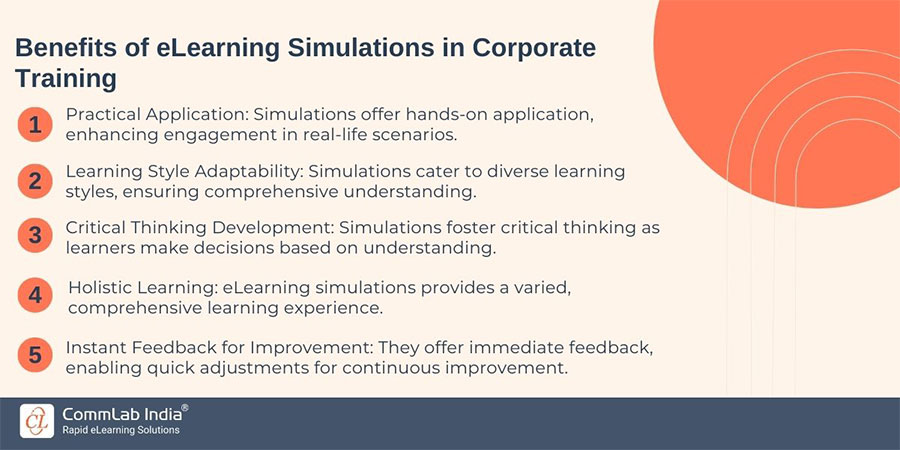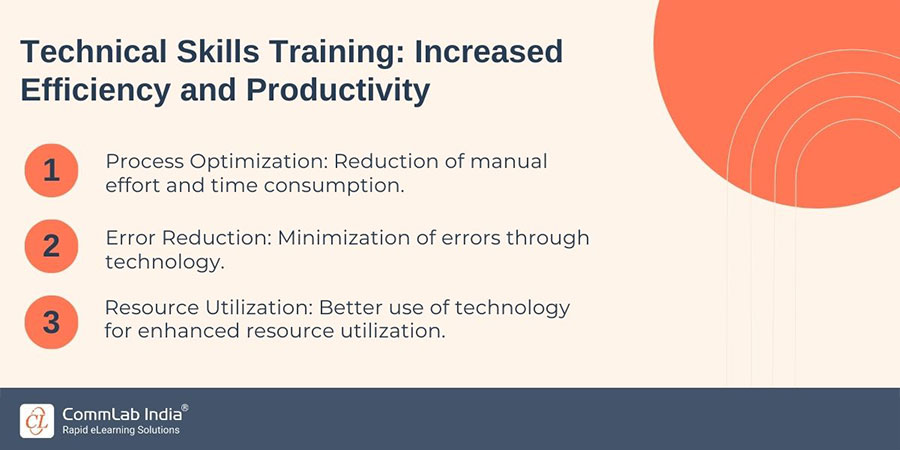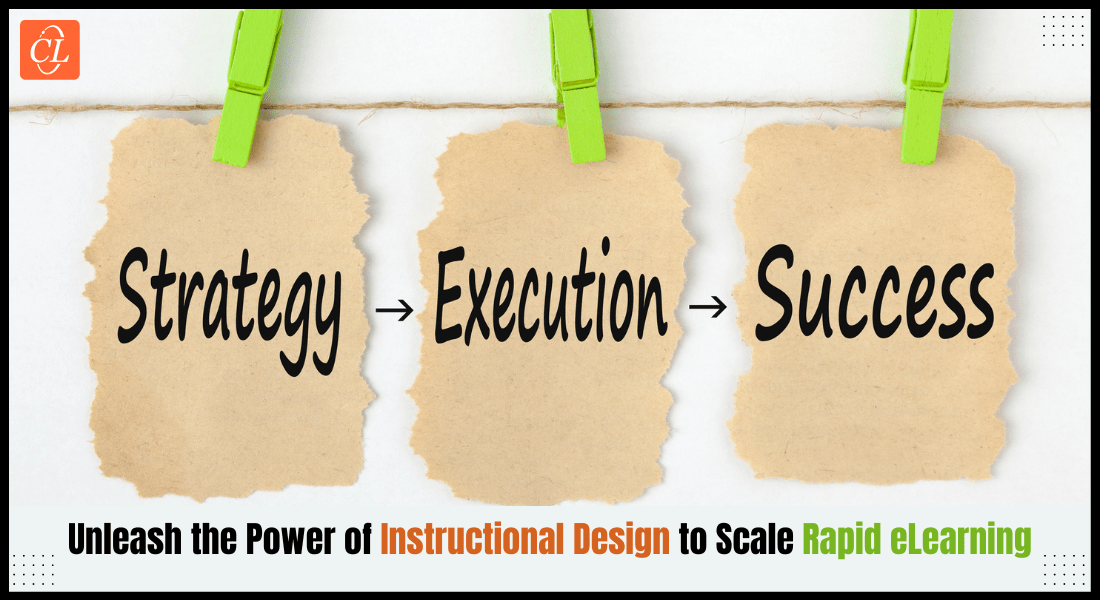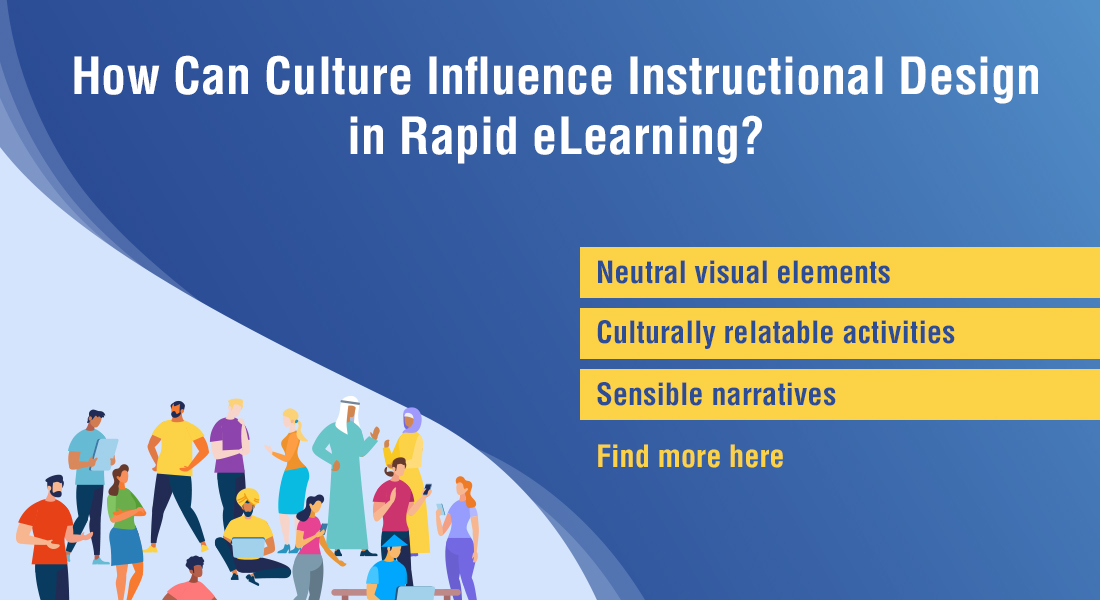How Do eLearning Simulations Transform Industries?
eLearning simulations replicate real-world scenarios and revolutionize learning. Explore how they break barriers and elevate diverse industries.

In the ever-evolving landscape of corporate training, the influence of simulations on instructional design is nothing short of revolutionary. These sophisticated learning tools go beyond mere industry boundaries, transforming the way professionals interact with educational content. This exploration embarks on a comprehensive journey into the versatile realm of simulations, meticulously designed to address the unique challenges present in various sectors.
From healthcare to finance, manufacturing to technology, simulations introduce a flexible and adaptive approach to immersive learning, and this blog discusses them in detail...
What are eLearning Simulations?
eLearning simulations are immersive digital experiences that replicate real-world scenarios, providing interactive and engaging environments for learners to acquire and practice skills in a risk-free setting.
eLearning simulations offer -
- Hands-On Learning: Simulations provide practical experiences.
- Risk-Free Practice: Learners make mistakes without consequences.
- Engagement Boost: Interactive scenarios enhance motivation.
Responding to the evolving dynamics of technology and the modern workforce, eLearning simulations, with their ability to replicate real-world scenarios, have become instrumental in providing engaging and effective learning experiences.

Let's now delve into how simulations are transforming industries, unraveling their impact through concrete examples.
Simulations Transforming Industries: Impact & Examples
1. Healthcare: Precision Training
In the healthcare sector, precision is paramount, and simulations, a vital component of instructional design, provide medical professionals with an immersive environment to hone their skills. This extends to practicing intricate surgical procedures and patient interactions within a risk-free space, fostering competence and confidence.
For instance, surgeons actively refine their techniques using a virtual surgery simulation, contributing to continuous improvement in patient care outcomes through regular, hands-on practice.
2. Finance: Navigating Complexity
In the financial industry, eLearning simulations play a crucial role in instructional design, demanding a deep grasp of complex concepts, risk management, and decision-making. These simulations offer a realistic platform for professionals to test their skills in trading, investment strategies, and financial analysis, all within a controlled and simulated environment.
For example, financial analysts actively participate in a simulated stock trading environment, applying their knowledge in real-time and gaining practical experience without exposure to the financial risks associated with live markets.
3. Manufacturing: Streamlining Operations
Efficiency and precision are the backbone of the manufacturing sector, where eLearning simulations play a pivotal role in optimizing training outcomes. By immersing employees in virtual production environments, these simulations facilitate hands-on learning experiences across various aspects, including machine operations and supply chain management.
For example, a virtual assembly line simulation helps workers understand the intricacies of the manufacturing process, identify potential bottlenecks, and streamline production workflows. This comprehensive training approach contributes significantly to improved efficiency, reduced errors, and enhanced overall productivity within the manufacturing industry.
→ Download Now: Instructional Design Strategies 101 [eBook]
4. Technology: Innovation Challenges
The tech landscape is dynamic, and to navigate it effectively, IT professionals must engage in continuous learning and problem-solving. Simulations are pivotal in providing a platform for hands-on experience with evolving technologies, addressing cybersecurity challenges, and refining troubleshooting skills. In this context, eLearning simulations stand out as essential tools for corporate training.
A prime example is an IT security simulation that immerses participants in real-world cyber threats, enabling the development and application of strategies to safeguard sensitive information, fortifying the technology environment.

5. Retail: Customer-Centric Training
Customer service takes center stage in the retail industry, and eLearning simulations are instrumental in refining interactions. Simulations in retail training empower employees to handle inquiries and manage challenging situations, creating a customer-centric mindset.
For instance, a virtual store simulation allows retail associates to practice responding to customer inquiries, offering personalized recommendations, and addressing common challenges. This immersive approach not only enhances customer service skills but also contributes to an elevated overall customer experience, showcasing the impact and versatility of eLearning simulations in retail corporate training.
6. Education and Coaching: Interactive Learning
In the education sector, simulations are revolutionizing traditional teaching methods, breathing life into lessons through interactive and immersive online training experiences. Educators harness the power of simulations to captivate students within a virtual learning environment, creating dynamic lessons that enhance comprehension and retention through experiential learning.
For instance, a physics simulation enables students to conduct virtual experiments, delving into scientific concepts in a dynamic and interactive setting. This approach not only fosters a deeper understanding of theoretical principles but also underscores the transformative impact of online training through engaging and hands-on educational simulations.
7. Hospitality: Elevating Guest Experience
In the hospitality sector, where guest satisfaction is paramount, simulations become invaluable tools for enhancing staff readiness through immersive employee training. These simulations allow hotel staff to practice customer service, conflict resolution, and emergency response, ensuring they are well-prepared for real-world situations.
For example, a hotel simulation immerses staff in various scenarios, including check-in processes, handling guest complaints, and responding to emergency situations. This comprehensive training approach not only ensures staff readiness but also contributes significantly to an elevated guest experience through effective and prepared hospitality professionals.
How to Select the Right Tools for Software Simulation Development?
Conclusion: Transformative Learning Future
As we navigate the diverse applications of simulations across industries, it becomes evident that this immersive learning approach has the power to revolutionize corporate training. Tailoring simulations to specific industry need not only enhances skill development but also fosters a culture of continuous improvement. The future of learning lies in the adaptability and versatility of simulations, creating a transformative impact on workforce development across diverse sectors.
Enhance your training with top Instructional Design strategies! Download our eBook for impactful insights beyond simulations.
Download now!





